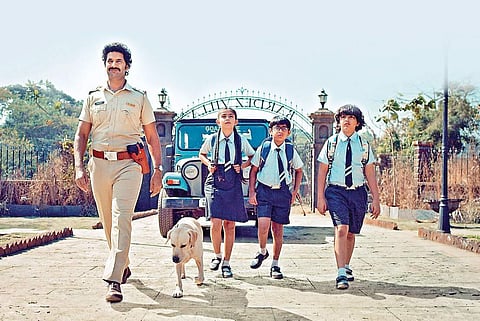

Netflix’s new series Typewriter, from Sujoy Ghosh, is set in a somewhat sleepy town of Bardez, Goa. Even the word Bardez evokes something fantastical, the lair of a once-powerful, unrecognisable force or the den of an evil overlord. For all these foreign influences, the etymology of Bardez is quintessentially Indian. And therefore, we get a quintessential Indian spooky story.
A story that originates from a book, loosens itself up in the flesh and blood present, goes back into the book in a different time and then hops out to resolve itself. Bardez in Typewriter, in the 80s, was the town of Madhav Mathew, a writer, living in the eponymous villa with his daughter and granddaughter. The villa is sprawling, and Typewriter maybe 5 episodes long with an average runtime of 50 minutes each, and yet the villa’s geography is a mystery to us. Madhav’s writer’s room is the busiest, considering that is where he keeps his typewriter, but the villa is a cipher throughout in more ways than one. Information is dispersed on a piecemeal basis, the current occupants, the past occupants. The series even jumps between decades.
The one-line summary of Typewriter is nothing new — there is a villa that is supposedly haunted, and the unlikeliest local bunch are the only inquisitive minds around — school kids Sameera, Gablu, and Bunty with a dog for company. A whiff of Stranger Things is not far behind though no one goes missing in Typewriter. Madhav’s books populated by ghosts and spirits are almost rite of passage for the people of Bardez. If you haven’t read them, are you even from here? So, we see them constantly in the hands of Sam, the kids mulling over it endlessly and there is Nick, who is not allowed to read it because it, quite literally, hits a little too close home for him.
You know, Madhav the author is Nick’s great-grandfather and he has just moved into Bardez Villa along with his mother Jenny, father Peter and elder sister Anya. The beginning of Typewriter is legitimately spooky — it is the early 1980s and we meet Jenny, not more than 5-6 years old. She says there is someone crying under her bed. Madhav reassures her that nothing of that sort exists and ghosts exist only in his stories. That statement assumes a new import as the series progresses, but we do encounter the crying figure — not a monster, but just another Jenny under the bed.
The initial portions show a lot of promise. Sameera’s father Ravi, played by Purab Kohli, is a police officer, single dad. She is the most enthusiastic wannabe ghostbuster, who has a not-so-well concealed agenda behind her dabbling ways. Her agenda is no different from Jenny’s, who begins to look for her nanny from decades ago even before unpacking her boxes.
Typewriter strings together a number of broken families, decades apart; broken by force, broken by circumstances, broken by people, broken by mysterious forces. Ghosh’s frames are lit in idiosyncratic ways — reds and greens dominate the bar in Bardez when it is functioning and gives way to a more sober setting in the restroom where something evil is afoot. It’s called the Good Head Bar but the people doing business with it have lost their heads a long time ago.
Sameera and Ravi’s home gives a colourful vibe, their happiness couched in the smaller details of life — even after switching off the lights, the colours still dazzle from the window curtains. By contrast, the Villa is only impressive from the outside. Sprawling outfield, an imposing gate but the insides are dull, grainy and rusty. Ghosh’s staples can all be found — ordinary men doing ordinary jobs double up as assassins, revenge is at the heart of the plot and the cape-wearing ones aren’t the heroes.
One of the problems with Typewriter is that it rations the screen time of the children. Apart from the setup and the final minutes, the children get very little to do. It would have been great to have them at the centre of the Villa, where they have always wanted to go, along with Jenny (Palomi Ghosh), with whom the mysteries begin and end. Often, we scoff at precocious kids in cinema, but Typewriter felt like the show where we could have done with some kids trying to behave like adults, or maybe even do better than adults.
The series goes through several genre shifts — from horror to mystery to procedural to an action-adventure and never settles on one. There is also a painful subplot involving Jenny’s husband Peter that is left askew in the interest of a second season. Typewriter remains a solid idea, even if inspired or derivative, that could have been so much better. There is even a religion angle that’s left unexplored. Ironically, most good things about Typewriter are only on paper.
Now streaming on Netflix.